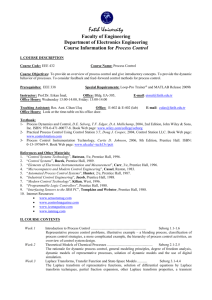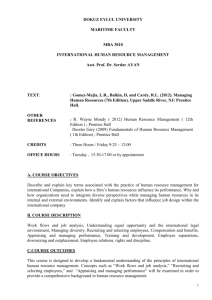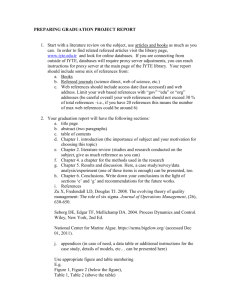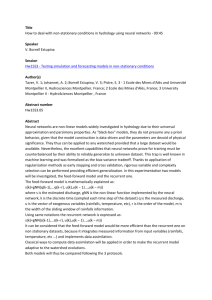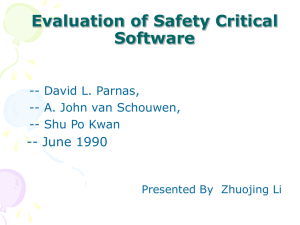ii. course contents
advertisement
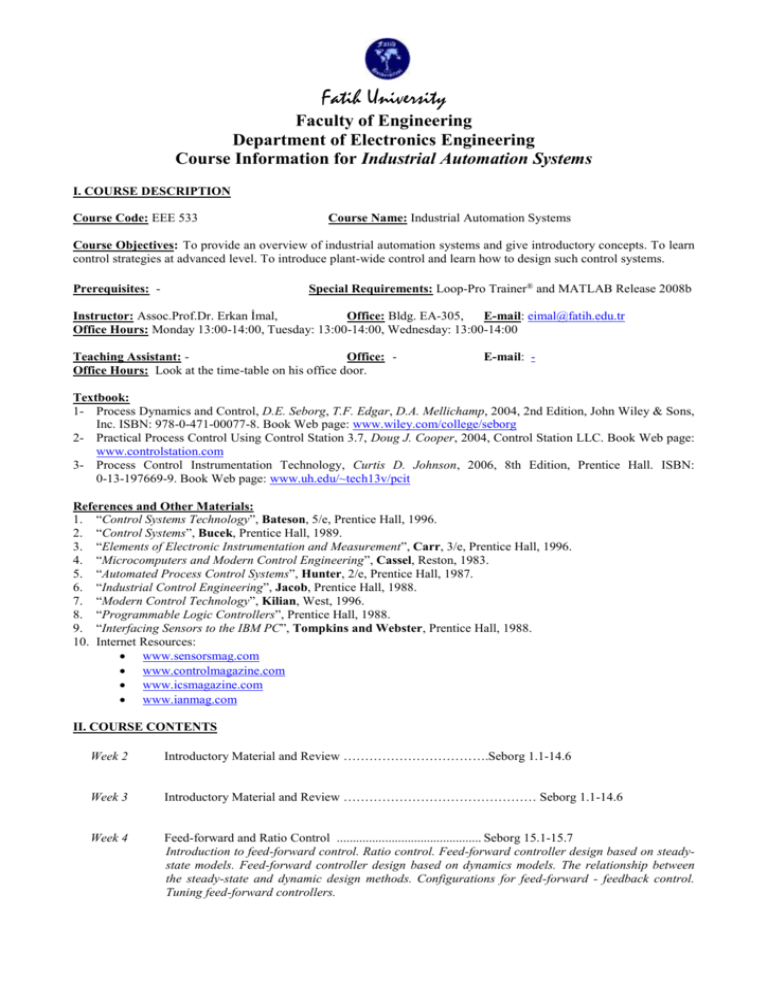
Fatih University Faculty of Engineering Department of Electronics Engineering Course Information for Industrial Automation Systems I. COURSE DESCRIPTION Course Code: EEE 533 Course Name: Industrial Automation Systems Course Objectives: To provide an overview of industrial automation systems and give introductory concepts. To learn control strategies at advanced level. To introduce plant-wide control and learn how to design such control systems. Special Requirements: Loop-Pro Trainer® and MATLAB Release 2008b Prerequisites: - Instructor: Assoc.Prof.Dr. Erkan İmal, Office: Bldg. EA-305, E-mail: eimal@fatih.edu.tr Office Hours: Monday 13:00-14:00, Tuesday: 13:00-14:00, Wednesday: 13:00-14:00 Teaching Assistant: Office: Office Hours: Look at the time-table on his office door. E-mail: - Textbook: 1- Process Dynamics and Control, D.E. Seborg, T.F. Edgar, D.A. Mellichamp, 2004, 2nd Edition, John Wiley & Sons, Inc. ISBN: 978-0-471-00077-8. Book Web page: www.wiley.com/college/seborg 2- Practical Process Control Using Control Station 3.7, Doug J. Cooper, 2004, Control Station LLC. Book Web page: www.controlstation.com 3- Process Control Instrumentation Technology, Curtis D. Johnson, 2006, 8th Edition, Prentice Hall. ISBN: 0-13-197669-9. Book Web page: www.uh.edu/~tech13v/pcit References and Other Materials: 1. “Control Systems Technology”, Bateson, 5/e, Prentice Hall, 1996. 2. “Control Systems”, Bucek, Prentice Hall, 1989. 3. “Elements of Electronic Instrumentation and Measurement”, Carr, 3/e, Prentice Hall, 1996. 4. “Microcomputers and Modern Control Engineering”, Cassel, Reston, 1983. 5. “Automated Process Control Systems”, Hunter, 2/e, Prentice Hall, 1987. 6. “Industrial Control Engineering”, Jacob, Prentice Hall, 1988. 7. “Modern Control Technology”, Kilian, West, 1996. 8. “Programmable Logic Controllers”, Prentice Hall, 1988. 9. “Interfacing Sensors to the IBM PC”, Tompkins and Webster, Prentice Hall, 1988. 10. Internet Resources: www.sensorsmag.com www.controlmagazine.com www.icsmagazine.com www.ianmag.com II. COURSE CONTENTS Week 2 Introductory Material and Review …………………………….Seborg 1.1-14.6 Week 3 Introductory Material and Review ……………………………………… Seborg 1.1-14.6 Week 4 Feed-forward and Ratio Control ............................................. Seborg 15.1-15.7 Introduction to feed-forward control. Ratio control. Feed-forward controller design based on steadystate models. Feed-forward controller design based on dynamics models. The relationship between the steady-state and dynamic design methods. Configurations for feed-forward - feedback control. Tuning feed-forward controllers. Week 4 Feedback, Feedforward and Ratio Control ................................................. Seborg 15.1-15.7 Introduction to feed-forward control. Ratio control. Feed-forward controller design based on steadystate models. Feed-forward controller design based on dynamics models. The relationship between the steady-state and dynamic design methods. Configurations for feed-forward - feedback control. Tuning feed-forward controllers. Week 5 Enhanced Single-Loop Control Strategies ................................. Seborg 16.1-16.6 Cascade control. Time-delay compensation. Inferential control. Selective control / Override systems. Nonlinear control systems. Adaptive control systems. Week 6 Digital Sampling, Filtering, and Control ............................................... Seborg 17.1-17.6 Sampling and signal reconstruction. Signal processing and data filtering. z-Transform analysis for digital control. Tuning of digital PID controllers. Direct synthesis for design of digital controllers. Minimum variance control. Week 7 Multi-loop and Multivariable Control........................................ Seborg 18.1-18.6 Process interactions and control loop interactions. Pairing of controlled and manipulated variables. Singular value analysis. Tuning of multiloopPID control systems. Decoupling and multivariable control strategies. Strategies for reducing control loop interactions. Week 8 Real-Time Optimization .......................................................................... Seborg 19.1-19.5 Basic requirements in real-time optimization. The formulation and solution of RTO problems. Unconstrained and constrained optimization. Linear programming. Quadratic and nonlinear programming. Week 9 Midterm Week 10 Model Predictive Control .......................................................... Seborg 20.1-20.7 Overview of model predictive control. Predictions for SISO models. Predictions for MIMO models. Model predictive control calculations. Set-point calculations. Selection of design and tuning parameters. Implementation. Week 11 Process Monitoring .................................................................................. Seborg 21.1-21.5 Traditional monitoring techniques. Quality control charts. Extensions of statistical process control. Multivariate statistical techniques. Control performance monitoring. Week 12 Batch Process Control ............................................................... Seborg 22.1-22.5 Batch control systems. Sequential and logic control. Control during the batch. Run-to-run control. Batch production management. Week 13 Introduction to Plant-wide Control .......................................................... Seborg 23.1-23.4 Plantwide control issues. Hypothetical plant for plantwide control studies. Internal ffedback of material and energy. Interaction of plant design and control system design. Week 14 Plant-wide Control System Design ........................................ Seborg 24.1-24.4 Procedures for the design of plantwide control systems. A systematic procedure for of plantwide control system design. Case study: The reactor/flash unit plant. Effect of control structure on closedloop performance. Week 15 Review III. LABORATORY EXPERIMENTS, TUTORIALS, AND OTHER ACTIVITIES N/A IV. EXAM DATES, GRADING POLICY AND ATTENDANCE Exam Dates Midterm Exam : 20 April 2009 (week 9) Final Exams : June 08, 2009 – June 19, 2009 2 Grading Policy Homework: 15 %, Quiz: 15%, Midterm Exam: 30 %, Final Exam: 40 % Attendance (Clause 17 of the Undergraduate Regulation) Classroom attendance is mandatory. Students, who are absent over 30% of the class time and 20% of the lab time, automatically fail the course. Repeating students are exempt from attendance for a theoritecal course only if the attendance is fulfilled at least once for that course before. Honor Code: All work done on the exams will be done on your own and pledged. Students may discuss homework concepts and approaches, but the work will be done by the individual. Group or copied solutions are not permitted. Homework is considered pledged simply by its receipt. Late Work and Examinations: Normally, homework is due one week from the assigned date, unless otherwise indicated or previous arrangements are made. Late homework will be accepted due to sickness only. Students who know that they are going to miss class and/or lab session should make arrangements in advance. Only selected homework problems may be graded from the set turned in. The others will be checked for completion. Exams will be closed notes, open book and in-class. 3
